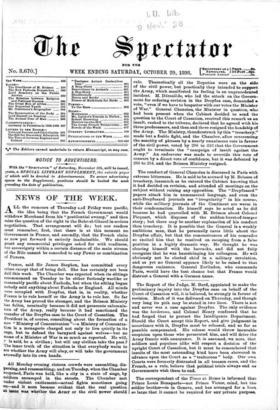All Monday evening riotous crowds were assembling, dis- persing, and
reassembling; and on Tuesday, when the Chamber reopened, Paris was held, like a city in a state of siege, by soldiers encamped in the streets. The Chamber met under violent excitement—actual fights sometimes going on—and it soon became evident that the real question at issue was whether the Army or the civil power should
rule. Theoretically all the Deputies were on the side of the civil power, but practically they intended to support the Army, which manifested its feeling in an unprecedented incident. M. Deroulede, who led the attack on the Govern- ment for ordering revision in the Dreyfus case, demanded a vote, "even if we have to bespatter with our votes the Minister of War." General Chanoine, the Minister in question, who had been present when the Cabinet decided to send the question to the Court of Caseation, received this remark as an insult, rushed to the tribune, declared that he agreed with his three predecessors, and then and there resigned the headship of the Army. The Ministry, thunderstruck by this " treachery," made but a feeble fight, and the Chamber, after reverencing the sanctity of phrases by a nearly unanimous vote in favour of the civil power, voted by 296 to 24:3 that the Government ought to terminate the "campaign of insult against the Army." An endeavour was made to override this vote of censure by a direct vote of confidence, but it was defeated by 286 to 254, and the Brisson Ministry resigned.






































